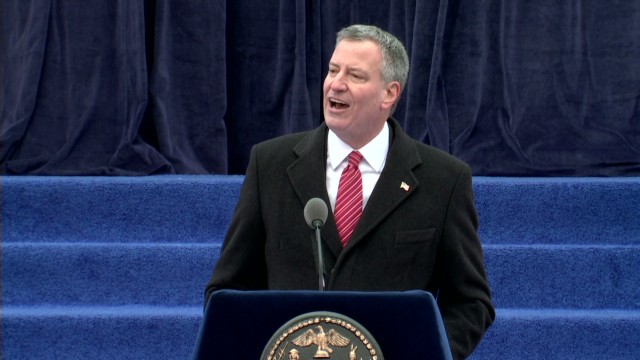De Blasio has it wrong. The rich aren’t the problem in the “inequality crisis.”

New York City mayor Bill de Blasio gave a kind of St. Crispin’s Day speech for progressives at his New Year’s Day inauguration ceremony. He evoked a city ravaged by a crisis of inequality. What Rudy Giuliani was to out-of-control crime, de Blasio wants to be to rampant inequality — its scourge and vanquisher.
Yet for all his impassioned egalitarianism, the new mayor neglected the great equalizers, those qualities that are the bedrock of success in America and the key to mobility. Like so many others on the left, de Blasio is loath to detract from the false but ideologically congenial narrative of the rich dispossessing the poor. So he gives short shrift to the basics of marriage, education, and work — all grounded in an ethic of personal responsibility — that make it possible for people to escape and avoid poverty.
Anyone can be a victim of bad luck — especially in a weak economy — but the essential formula for eluding poverty isn’t complicated: Graduate from high school, get a job, and get married before having children. Ron Haskins of the Brookings Institution writes in the journal National Affairs, “Census data show that if all Americans finished high school, worked full time at whatever job they then qualified for with their education, and married at the same rate as Americans had married in 1970, the poverty rate would be cut by around 70 percent — without additional government spending.”
The breakdown of marriage, in particular, drives impoverishment. The poverty rate is about six times higher for single-parent families than two-parent families. About 70 percent of all poor families with children are single-parent families. According to Robert Rector of the Heritage Foundation, if single mothers were to marry the fathers of the children, about two-thirds of them would no longer be poor, in a stupendously effective anti-poverty program.
Then there’s education. A college degree is a rocket booster on income mobility. Among children from families in the bottom fifth of the income distribution, 84 percent of those who go on to get a college degree will escape the bottom fifth, and 19 percent will make it all the way to the top fifth, according to Haskins. Among kids from those families who don’t get a degree, 45 percent will remain in the bottom fifth. (In his speech, de Blasio did cite his highest-profile educational initiative, more funding for pre-K education.)
And, finally, there’s work. “Even in good economic times,” Robert Rector writes, “the average poor family with children has only 800 hours of total parental work per year — the equivalent of one adult working 16 hours per week. The math is fairly simple: Little work equals little income, which equals poverty. If the amount of work performed by poor families with children was increased to the equivalent of one adult working full time throughout the year, the poverty rate among these families would drop by two-thirds.”
The bottom line is success ultimately depends on habits that money can’t buy. In a book-length study of the influence of parental income on the prospects of children, Susan Mayer found a complicated picture. She writes that “parental characteristics that employers value and are willing to pay for, such as skills, diligence, honesty, good health, and reliability, also improve children’s life chances, independent of their effect on parents’ income. Children of parents with these attributes do well even when their parents do not have much income.”
This is the rub — and the dishonesty at the center of de Blasio’s vision. The rich aren’t causing anyone to have children out of wedlock, or drop out of high school, or stop looking for a job. They aren’t undermining discipline or eroding industriousness. They have nothing to do with failing schools or dangerous neighborhoods. Even if you believe their incomes are too high and their taxes too low, they don’t make it harder for anyone else to get ahead.
In other words, they don’t cut anyone off from the foundations of success that are the country’s great equalizers.
— Rich Lowry is the editor of National Review. He can be reached via e-mail: comments.lowry@nationalreview.com. © 2013 King Features Syndicate
No comments:
Post a Comment